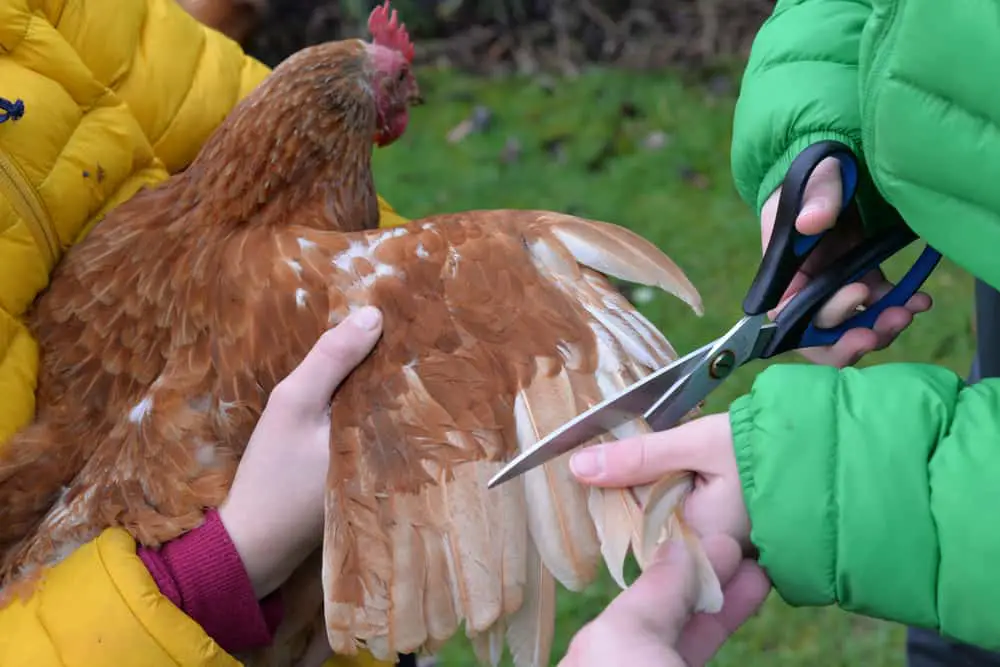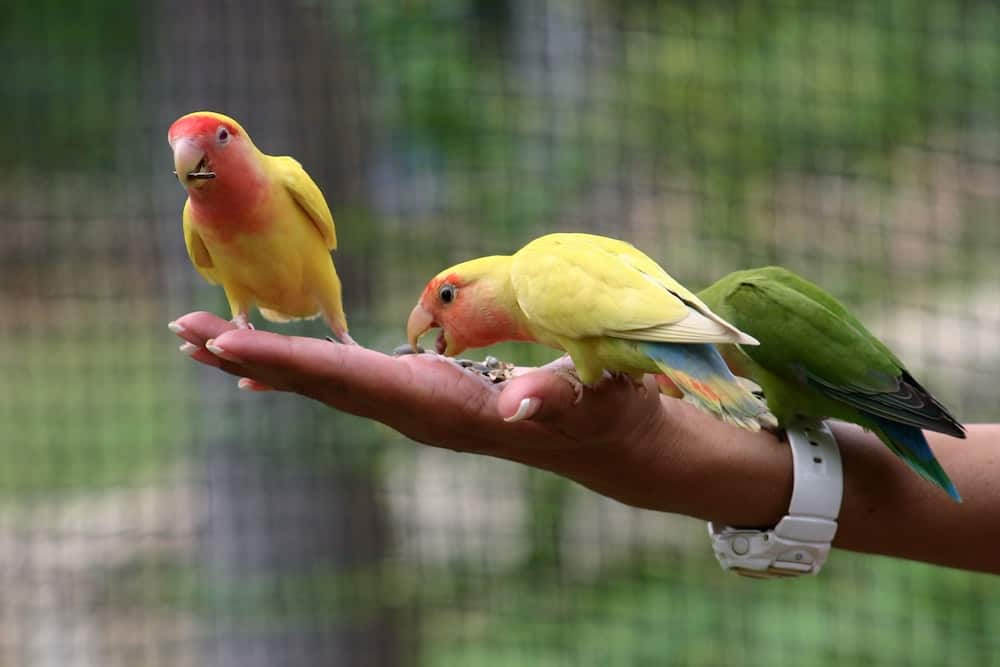Wing clipping is a process that inhibits a bird's ability to accelerate and fly properly. It limits their wing mobility to fluttering and safely gliding to the ground.
Whether this practice is beneficial because it reduces safety risks or if it is ultimately cruel because it prevents their natural mobility has become an important topic of debate.
Wing clipping is more unnecessary than cruel. It can definitely have negative side-effects on a bird's physical and mental health. Even though a bird can live a long life with clipped wings – will it be happy and fulfilled? Unfortunately, wing clipping is often done for an owner's convenience, not a bird's happiness.
Read on to learn more about the process of wing clipping and how it can affect a bird. This article will mostly focus on pet birds rather than an expansive stance that also includes birds in zoos and reserves. Most birds in those environments will have clipped wings for containment purposes and their overall health.
What Is Wing Clipping?
Wing clipping is the process of trimming a bird's primary and sometimes secondary wing feathers to inhibit its ability to lift up for full flight.
The process itself is relatively simple and only requires a pair of sharp and sanitized scissors. It is also short-term, as the primary feathers will grow back and need to re-clipped if this is your choice.
Ideally, you need to leave a couple of the first primary feathers and only trim the majority of these feathers until they nearly meet the primary and secondary coverts.
The best thing to do is always start by cutting less and slowly trim more of the primary wings as necessary to prevent sufficient lift for flight.
Even this is not a painful process, you still need to handle your bird with extreme care and be in a controlled environment. And remember that it is essential to clip both sides of your bird's wings. Clipping only one wing will leave the bird unbalanced and increase their risk of injury.
Is It Cruel?
Wing clipping is a very controversial topic. At a basic level, this process is certainly not as painful as other house pet procedures – like de-clawing cats or removing a dog's voice box .
However, it could still be considered cruel because it takes away a bird’s natural ability for human convenience. The fact that birds are not domesticated animals makes it even more difficult to justify.
Ultimately, clipping a bird's wing is performed for the owner's convenience rather than the welfare and happiness of the bird.
Many owners claim that it is also for the safety of their bird. So that they don't injure themselves on stovetops, fans, and other potential home dangers. However, these potential dangers can easily be mitigated or removed for safe flight in a controlled environment.
Sometimes, owners also choose to clip their bird's wings because they don't want to supervise them during flight. Others might be concerned that their bird will make a mess of their home and get into mischief given the freedom of flying. Which, honestly, they probably will.
Birds are highly intelligent animals. And of those, ravens and parrots are the most intelligent birds in existence. New research suggests that parrots' intelligence is comparable to chimps, dolphins, or a 5-year-old human.
Because they’re so bright – these animals are highly inquisitive and explorative. They thrive on activity and stimulation, and the best way to achieve this is by flying. So they will want to fly around your home and explore its contents. Inhibiting this can have severe consequences.
Why You Shouldn't Clip a Bird's Wings
You might think wing clipping increases your bird's safety in your home when, in reality, it could have the opposite effect. In addition to being unnatural, there are many reasons why wing clipping is unsafe and unhealthy for your bird and could even reduce their lifespan.
Stunts the Bird's Development
If you are clipping a bird's wings, especially a young bird, it could significantly stunt the development of their muscles and their flying abilities. Even if you plan to temporarily clip your bird's wings, which is an option since the primary wings will grow back and need reclipping, you could cause irreparable damage that will increase their risk of injury later in life.
Flying is essential for strengthening a bird's chest muscles and the development of its brain, balance, and coordination.
A fledgling that has clipped wings and doesn't learn how to fly at a young age will never be able to fly as well as a bird that has done so from the beginning.
As a result, if you ever decide to stop clipping your bird's wings, you might find they have issues bumping into walls or windows or other coordination problems because they did not develop their flying skills properly at a young age.
Injures the Bird If Done Improperly
Clipping a birds wings can be compared to cutting your hair or nails from a discomfort perspective – it is not painful. However, if you don't know how to clip wings the right way – please don't do it.
Birds have feathers known as blood feathers that are sensitive and can cause significant bleeding when cut. Not only would this be painful for your bird, but it could also cause it to panic.
It can be difficult to discern a blood feather from newly grown feathers, so be sure to educate yourself on the wing clipping process before you attempt it.
Causes Damage Psychologically and Physically
This is a big one. You should never limit an animal's natural form of mobility, wild or domesticated.
A dog shouldn't be left in a crate for 8+ hours, a large fish shouldn't be in a small bowl, and you shouldn't prevent a bird from flying. The most significant cons of wing clipping are found here.
Phycological Effects
Psychologically, wing clipping can be extremely damaging to a bird. Since birds are prey animals, flying is their only form of defense and escape apart from biting and scratching. When a bird is incapable of flight, they tend to be more insecure and scared.
As a result of living in this state of fear, devoid of confidence, your bird will become very attached to you. Now, for some owners, this is what they want; a strong bond between them and their bird. Unfortunately, this bond can be extremely stressful and even debilitating with its own set of consequences.
Frightened birds tend to be more aggressive, which means your bird is more likely to bite or scratch you or other pets and humans.
An over-dependent bird is also more likely to scream to obtain affection and attention when left alone. Birds are significantly loud pets, and a continually screaming bird can certainly wear anyone down.
In addition to screaming for attention, an overly dependent bird is more likely to have behavioral issues, such as feather plucking, when they are alone because their owner's absence is too stressful.
These behavioral issues are all signs that your bird isn't receiving enough stimulation to release excess energy they could have alternatively worked-out through flying.
Physical Effects
Birds have evolved over 60 million years, and every element of their physical structure is designed to support flight.
Their respiratory system is developed to take-in vast amounts of oxygen at once. And their hearts are incredibly strong and beat faster than the average humans to carry all that oxygen to their muscles, again, to support flight.
If birds are deprived of flight, they are at increased risk of diseases and obesity since they aren't exercising in the way most natural to them. The exercise provided by flight will increase the strength of their heart, air sack, muscles and prevent diseases from a fatty liver.
Increases Risk of Accidents in the Home
It is nearly impossible to remove all scenarios of potential harm from your home for your bird's safety, so sometimes, your bird needs the ability to fly to protect itself.
If you have a cat, dog, or other pets in your home that could harm your bird, its natural defense mechanism is to flee through flying.
Of course, if their wings are clipped, that defense mechanism has been taken away, and the only thing your bird can do to protect itself is to bite or scratch its aggressor. As a result, pets could easily harm each other, or worse, your bird could be killed because it could not escape.
Another potential risk for a flightless bird is being crushed or stepped on by a passerby. Many common pet bird species, such as parakeets and finches, are relatively small.
If you let your bird out of its cage for some freedom and they have clipped wings, their mobility is significantly inhibited. This leaves your pet vulnerable to being stepped on or crushed by a falling object because they can't escape quickly enough.
Is It Ever Okay to Clip Wings?
Wing clipping is ultimately a choice. We argue that most owners claim to do it for their birds' safety when in reality, they don't want to take the time to create a safe environment for flight and supervise their birds when they aren't in their enclosure.
To be clear, all birds, clipped or otherwise, should be fully supervised when they are not in their enclosure. Even a clipped bird can fly into a window or escape. Clipping their wings inhibits full flight, but they can still flutter above the ground and glide out of a room or house.
That being said, there are situations when clipping your bird might be the best option for their sake as well as your own or other animals.
Here is a list of justifiable scenarios for clipping your bird's wings:
Ultimately, we strongly suggest that you research the pros and cons of wing clipping and educate yourself on bird ownership before obtaining a pet bird and choosing to clip its wings.
Final Thoughts
In the end, clipping a bird's wings is an owner's choice. It is not necessarily cruel, but it could severely inhibit your bird's mental health and quality of life.
Make sure that if you are clipping a bird's wings, it is for the right reasons. Don't clip them because you want to let them out of the enclosure unsupervised. All birds need supervision in these situations.
If you are concerned for your bird's safety while it’s flying but are wary of clipping its wings, try buying them a harness and leash. This will provide control during supervised flights while allowing them their natural freedom.


